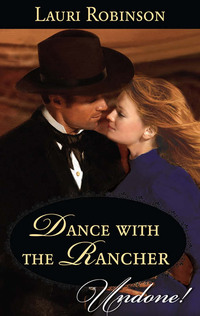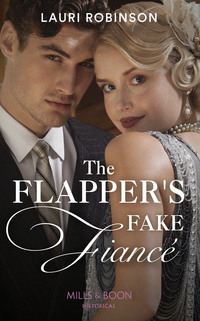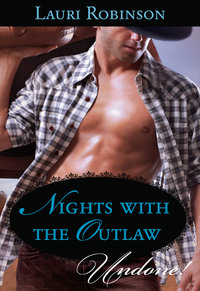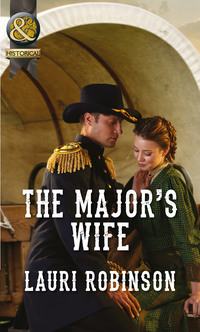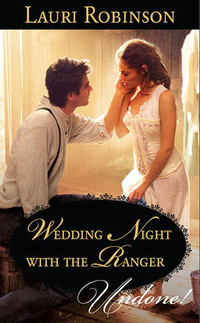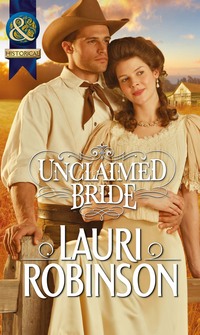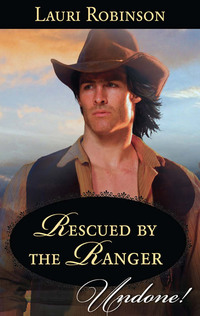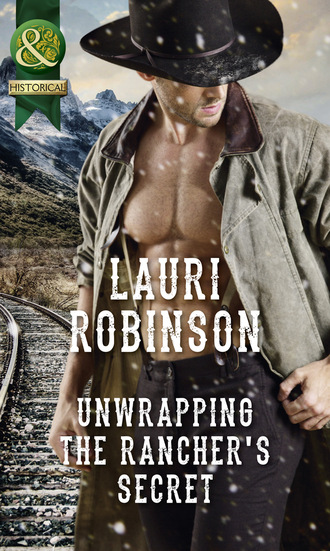
Полная версия
Unwrapping The Rancher's Secret
As soon as she was free, she scooted along the seat, farther away from him. “You’re—you’re dead,” she whispered. “Dead.”
“I could apologize for that, but since I wasn’t the one to put that idea in your head, I won’t. As you can clearly see, I’m not dead. Never was.” A shred of guilt laced his gut at the way she trembled. He tried to ignore it, but in the end, he told himself she wasn’t to blame and holding his father’s faults against her wouldn’t be fair. Despite his parentage, that was one thing he did pride himself on: being a fair man. An honest one, too. It had taken him a long way in this life.
“How can that be?”
Crofton stopped his inner musings and shrugged. “Because it never was.”
“Fa—” She pinched her lips together for a second. “Winston said you died as a small child, back in Ohio, in a fire. He was devastated over it.”
“Was he?” The scorn slipped out before Crofton had a chance to conceal it.
“Yes,” she said. “He spoke of you often, especially—”
Her lips pinched tight and her thick lashes held teardrops when she lifted them. The sight was as unique as it was touching.
Once again Crofton had to detour his thoughts. “Especially when?”
“Before my little brother died. He was only four.”
“Your little brother?”
Looking up at him with moisture filled eyes, she nodded. “Yes, my little brother. Hilton. He died of the fever six years ago.”
Why that felt like a gut punch, Crofton wasn’t sure, but either way, he sat down. It would make sense that his father had gone on to have more children, but he’d never contemplated that aspect. Probably should have. “How many other children are there?” Wrestling a stepdaughter would be a simple enough feat; another blood son might not be. It wouldn’t stand in his way, though. Nothing would stand in his way of finding out why the railroad had pulled out of running a line south into New Mexico. He’d made promises on it, and he never broke a promise. There, too, he was nothing like his father.
“Other—” She shook her head. “None.”
“None?”
She wiped aside a teardrop sitting on her left cheek. “No, there were no more children, not before or after Hilton.”
Crofton withheld a grin, kept it hidden deep inside where only he knew it existed. “So it’s just you and me.”
After a lengthy hesitation, she met him eye to eye. “Yes. Just you and me.”
Chapter Two
The walls were closing in on her. She unbuttoned her cloak and shrugged it off her shoulders, but it didn’t help. The heavy black dress was just as suffocating. So was his nearness. Willing her legs to cooperate, she pushed off the sofa. She stumbled slightly, but caught herself. This was all impossible. Crofton Parks was impossible. He’d died years ago. Winston would never have lied about that. Not something that important. Actually, he wouldn’t have lied about anything. He was a good, honest man.
Gaining inner strength, she turned her attention to the stranger. He certainly resembled Winston. Dark brown hair, hazel-rimmed green eyes flecked with specks of gold. Tall. Broad at the shoulders and lean at the waist. He even had a dimple in the middle of his chin. However, he couldn’t possibly be Winston’s son. More like an impostor who was simply after her stepfather’s money. Winston’s wealth, the lumberyard he’d spent a lifetime building and his work with the railroad were well-known, perhaps nationwide or even worldwide.
Sara lifted her chin and tightened her neck muscles to keep her voice from quivering. “You, sir, are an impostor and I insist you leave immediately.”
He leaned back and swung a foot up to balance on his opposite knee. “I’m not an impostor, Sara—”
“I gave you no invitation to use my first name,” she snapped, unwilling to listen to anything he had to say. “If you don’t leave immediately, I’ll summon the sheriff.”
“And how will you do that?” he asked, crossing his arms. “You got a little bell you ring or something?”
His comment was so arrogant and smug that Sara wished she’d asked Bugsley to stay, or that Mrs. Long had returned. Something deep inside said she didn’t want to be alone with this man. He couldn’t be trusted, that was a given, but his uncanny resemblance to Winston was confusing her usual good sense.
Alvin Thompson who saw to the horses and other chores around the property lived just down the hill, but not within shouting distance. Nonetheless, she said, “I have men I will send to town.” A bluff, but he wouldn’t know that. “As a matter of fact, I have men who will take you to town. See you jailed for trespassing.”
Relief washed over her as he planted his foot back on the floor and stood. Without a word, he crossed the room and gathered his suit coat. She moved toward the open doorway, prepared to walk him all the way to the large front door, and lock it after he left.
Rather than putting on the coat, he pulled something out of a pocket and turned, holding an envelope out to her. “The sheriff’s out of town.”
Knowing Sheriff Wingard was out of town, and not wanting to dwell upon it, she asked, “What’s that?”
“An affidavit proving I am indeed Crofton Parks, son and heir of Winston Parks.” Still holding the envelope out for her to take, he added, “And Alvin won’t be any help. He’s at his job at the lumber mill.”
“How—” She bit down on her bottom lip, angry for allowing a word to slip out before she’d thought it through. Alvin did work at the mill, and had returned there upon leaving the church, so therefore, was not home.
“How do I know about Alvin? And Sheriff Wingard?” He laid the envelope on the desk as if it made no difference whether she read it or not. “I’ve made it my business to know.” Walking toward the windows framed by long olive-green drapes held back to let the sun in with gold rope ties, he said, “I also know everything about my father’s company and his deal with the railroad. And you. And your mother.”
The disdain in his voice was strikingly sharp. Out of defiance, Sara lifted her chin. “Why?”
“Because I’m his son.”
She wasn’t ready to believe that. Might never be. She did however want to know what he was doing here. “Anyone can have a piece of paper written up. That’s no proof whatsoever. Besides, if you truly were his son, you would have come to see Winston while he was alive. Any decent man would have.”
His back was to her as he stared out the window. The lumber mill was a distance down the mountainside, but large and visible from where he stood. So was the town of Royalton. Winston had often stood in that same spot, watching the hustle and bustle below. She’d stood there plenty of times herself.
“How do you know I didn’t?” he asked.
Sara didn’t know for sure, however there was one thing she knew for certain. “Because I knew Winston Parks. If his son was alive, and had contacted him, he would have told me. He would have told my mother. He would have shouted it from the rooftop.”
He turned. The smile on his face was false; the dullness of his eyes said so. Yet, at the same time, she couldn’t help but see Winston in him, and that was frightening.
“Maybe you didn’t know him as well as you thought,” he said.
Sara was saved from responding by the sound of the front door being opened, as well as someone saying her name.
“Mrs. Long is calling for you,” he said. “The housekeeper.”
He was attempting to intimidate her—something she refused to let happen. “Anyone in town could have told you who lives here, including Mrs. Long, and that the sheriff is out of town, and that Alvin Thompson lives next door so there’s no need to pretend you’re full of family secrets. There aren’t any.”
“You’re wrong, Sara,” he said softly. “There are lots of family secrets when it comes to Winston Parks.”
As much as she didn’t want to believe his words, she couldn’t ignore the clarity of his gaze.
“Oh, there you are,” Amelia Long said. “I—Oh, I didn’t know we had company.”
Sara didn’t turn around to where the woman was obviously standing in the doorway. Instead, she kept her gaze on the man, and held her stance. “We don’t,” she said. “He was just leaving.”
“Land sakes,” Amelia gasped. “It can’t be. Can it? Lord have mercy! Is it? Is it you, Crofton? Crofton, oh, sweet Lord! Tell me it’s really you! Tell me! Please, tell me!”
The smile that appeared on his face was as bright as sunshine. “Yes, Amelia, it’s me.”
Sara had no time to react, not even when the man rushed past her and caught Amelia as she slumped.
Crofton once again carried a woman across the room, questioning if every woman in Colorado fainted on a regular basis. This one was much older, heavier and not nearly as firm or sweet smelling as the younger one he’d carried mere minutes ago. But, this one had carried him around when he was little, and he’d never forgotten her.
Placing Amelia gently on the sofa, he told Sara, “Get some water. Unlike you, she’s not pretending. She really fainted.”
“I—I didn’t pretend.”
Crofton knelt near the sofa. “Just get some water, would you?”
She hurried out the door, and Crofton laid a hand on Amelia’s cheek. Her face was soft, full of wrinkles, and her blond hair streaked with gray, but she was as lovely to him as she had been twenty years ago when he used to wish she was his mother. Amelia had always had time for him. Never shooed him from the room or scolded him for getting dirty. She even helped dig worms and would drop whatever she’d been doing to take him fishing. At least that was how he remembered it. Just like he remembered her cooking had been the best he’d ever eaten. Especially her fried chicken. Of all the people, all the things he’d missed when his mother had whisked him off to England, it had been Amelia Long and her fried chicken.
Amelia stirred, and Crofton leaned closer. “Shh,” he whispered. “Just lie still for a moment. You’re fine.”
“Here.”
He took the glass of water Sara held out and as Amelia’s eyes opened, he gently raised her head up with his other hand. “Take a sip,” he said. “It’ll help.”
Watching him closely, Amelia took several small sips, and then shook her head. He handed the glass back to Sara before asking, “Are you feeling all right?”
“Yes,” Amelia answered. “I was just so shocked to see you. She told us you were dead.”
“I’ve heard that,” he said. “But as you can see, she was wrong.”
Amelia popped up with all the speed of a spring chicken. “Why would she have done such a thing? Oh, if only Winston could have seen you.” Sniffling, she wiped her nose with the tip of one finger as tears dripped down her wrinkled cheeks. “Oh, Crofton, he would have been so joyous. He never got over your death. Never.”
Damn, she was making his nose burn, and his chest. He bit the inside of his bottom lip. He’d never gotten over his father’s death, either. That hadn’t been possible for an eight-year-old who’d believed his father had been the bravest, strongest man on earth. His father had been his hero, up until he turned eighteen and learned the truth.
“Oh, that Ida,” Amelia growled. “I’d like to give her a piece of my mind. I tell you that. She always was nasty, but this—you—it’s downright evil. Evil I say.”
“She had her reasons, Amelia,” he said quietly.
“Oh, and what would they be?” Without waiting for a response, she added, “Pure selfishness is what she had. No reason is good enough for what she did—for this. Not a single one. Winston was so sick over your death, so lost and...” Sniffling again, she shook her head. “We all were. My heart is breaking all over again. For Winston. Oh, your poor, poor father. He loved you so much.”
To his surprise, Sara sat down next to Amelia and put her arm around her.
“Hush, now,” she whispered. “He knows Crofton is here now. He knows.”
Crofton pretended he hadn’t heard her words, but he had, and it appeared it had taken less convincing for her to believe he was Winston’s son than he’d expected.
“I expect he does,” Amelia said. “He was probably searching all over the pearly gates for his baby boy. Just like he did back in Ohio all those years ago.” Wiping at the tears on her cheek, she whispered, “He didn’t believe the news and went back to see for himself.”
Crofton couldn’t take much more. Of course Amelia would side with his father. Nate, her husband, had been in on Winston’s first lumber deal. Nate had died during the railroad wars, back in ’78, when both companies had brought in hired guns to settle their dispute over laying westbound tracks out of Colorado. A judge finally settled things, but there was still plenty of fighting going on. Both sides had gained ground. The narrow-gage line was working its way west through the mountains, and the standard-gage was running along the south end of the state. That was the set to run a line down into New Mexico, give ranchers a way to ship cattle. A way for him to ship his cattle, but the railroad had withdrawn for no apparent reason. He knew the reason. His father.
The silence in the room tickled his neck, and Crofton lifted his head to find both women looking at him expectantly. Having no idea what they’d asked, yet noting they were clearly waiting for an answer, he shrugged and turned it back on them. “What do you think?”
“I think she’s dead,” Amelia said with more hatred than he’d ever have expected to hear from her. “Otherwise, she’d have been trying to get money out of your father. Just like she did when you di—when she claimed you’d died.”
So the topic was his mother. He’d expected that. There had been no love lost between her and anyone left on this side of the ocean. With a nod, he stood and walked over to the fireplace. The mantel was massive, as was the hearth, with a large area to stack wood built right in the stone. It was an impressive design, something his father had been good at. Anyone who knew Winston said he was a visionary, could see what he wanted and didn’t stop until he got it. That, too, Crofton had inherited.
“That’s you.”
He frowned at Amelia’s statement, and then scanned the mantle, wondering what she referred to. A photo of a child sat in the center, in a polished frame.
“The one next to it is Hilton, taken shortly before he died.”
Sara had said that, and he took a moment to examine the other picture of a boy child, no more than a baby actually. There was a certain family resemblance, which caused an odd pang inside him.
Turning about, he said to Amelia, “I’m assuming my mother is still alive, but I can’t say for sure. I haven’t seen her in eight years.”
“Eight years?” Sara asked, biting her tongue as soon as the words were out. Although Amelia was convinced of this man’s heritage, she wasn’t. But, even if he was Winston’s son, he wasn’t to be trusted. Any man who hadn’t seen his father in over twenty years, and his mother in eight, had to be a scoundrel. A selfish, no-good rascal.
“Yes,” he answered. “Eight years. Since I left England.” His cold stare turned to Amelia, where it warmed slightly. “I left the day I learned my father was alive.”
“Alive?”
Sara was glad Amelia asked that. It had been on the tip of her tongue, but the years of being told to only speak when spoken to had returned.
“Yes. Just as my mother told him I was dead, she told me he was dead. That you all were dead.”
“Oh, that bitter woman,” Amelia hissed. “She’ll have her judgment day. Lord forgive me, but she will.”
He turned away from the fireplace, and after gazing at both her and Amelia for what seemed like an eternity, he gave a subtle nod. “I have an appointment I must see to now. Good day, ladies.”
Amelia shot to her feet. “You can’t leave, Crofton, you can’t.”
“I’ll be back,” he said, patting the hand she’d used to grab his arm. “I just have to see a man about a horse.”
His answer struck Sara to the core. Winston had always used that saying. Crofton obviously knew that and was trying to get a rise out of her. So was Amelia, the way she turned a set of sad eyes her way.
“Sara, tell him he mustn’t leave,” Amelia pleaded. “Tell him.”
That was the last thing she’d do. “Mr. Parks...” She let her words linger, telling him she didn’t completely believe that was his name. “Can most certainly leave.” And not return, she added silently, but knew he understood.
“No, he can’t,” Amelia insisted. “We have so much—”
“I’ll return for the evening meal,” he said, drawing Amelia’s attention. “If I can wrangle an invitation.”
The look he gave the older woman was enough to make Sara throw up, or see red, which she was doing.
“You don’t need an invitation,” Amelia said. “You’re family.” With a sigh, and while hugging his arm, she added, “It’s a miracle. A pure Christmas miracle having you here. Sara needs family right now. We all do.”
His gaze, which went over Amelia’s head to meet her stare, was as clear as the words written in the Good Book. Just as she was reading his mind, he was reading hers, and neither one of them considered the other family, nor did they believe this was a Christmas miracle.
Amelia followed him out of the room, and Sara moved to the window, waiting to see him leave. Her stomach was churning and her mind was spinning. His arrival could change everything. Winston’s dream. The railroad’s success. The town of Royalton. She had no right to fight him, no claim to all that Winston had left behind, but he wasn’t here to further Winston’s dream. Intuition told her that, and her allegiance to Winston said she couldn’t let his dream die. Couldn’t and wouldn’t.
During the years since Winston had built his lumber mill, over a hundred buildings and homes had been built in Royalton. The town had been transformed from a lumber camp to a bustling city, complete with stage coach service, and more important, a railroad depot. The entire town depended upon Parks Lumber. Jobs. The railroad. Prosperity for all.
It was all up to her.
The air in Sara’s lungs burned as Crofton appeared outside the window. He made a point of stopping the big roan he rode at the top of the hill, and turned around to tip his hat directly at the window. At her.
She didn’t respond, or move, other than the sinking of her stomach.
He nudged the horse and rode away. Once again she was reminded of Winston. Of all the times she’d watched him ride down that hill.
When Crofton, if that truly was his name, disappeared amongst the bustle of Royalton, Sara turned and walked to the desk. Rather than anything of Winston’s, the item that caught and held her attention was the envelope Crofton had left behind. Burning it would be the smart thing to do, but her curiosity was too strong for that. Taking up the sharp knife Winston always used to slit open the mail, she eased it beneath the flap.
“I can’t believe it,” Amelia said from the open doorway. “Just can’t believe it. All these years we thought he was dead. All these years.”
Sara set the envelope and the knife down. “Don’t you find it odd that he learned Winston wasn’t dead eight years ago, but never once visited? Never once tried to make contact?”
With eyes sadder than they had been this morning, Amelia shook her head and sat in the chair in front of the desk. “We have no way of knowing what she told him.”
“Who?”
“Crofton’s mother. Ida.”
Sara wasn’t willing to believe there was anyone to blame except Crofton. “He doesn’t seem like the type of man to take someone else’s word.” Or orders, she supplied completely for herself.
“I’m sure he’s not, just like Winston wasn’t, but Ida had a way about her.”
“What sort of way?” Sara asked.
“A sneaky, conniving one. That woman wouldn’t stop until she got her way. Ever.”
Amelia’s tone held more scorn than Sara had ever heard her use, and that alone would have been enough to make her jittery, if she hadn’t been already. Like mother, like son.
Slapping her knees, Amelia jumped to her feet. “I’m going to go fetch that hen that’s been pecking at the others. Crofton always liked fried chicken. Oh, that boy could eat like no other. I think I’ll bake a pie, too.”
“A pie?”
“Yes. Make us a real celebration dinner.”
“We just left a funeral,” Sara pointed out. “A celebration dinner wouldn’t be appropriate.”
Waving a hand at the desk, and the rest of the room, Amelia asked, “Do you think Winston would mind? Or your mother? They wouldn’t want us sitting around moping. They’d expect us to get on with life. And they would expect us to give Crofton a proper welcome home. It truly is a Christmas miracle.”
“Christmas is weeks away.”
Amelia shrugged. “So it is.” While heading for the door, she added, “And we both have to eat. Fried chicken is your favorite, too.”
Sara waited until Amelia left the room before mumbling, “It won’t be after today.” The letter lying on the desk, the one she’d been prepared to slit open moments ago mocked her. She was still curious, but did she really want proof Crofton was Winston’s son? Did she need proof?
The answer was obvious. Amelia would not say he was if he wasn’t. Furthermore, he was too much like Winston not to be his son. Besides looks, he had the attitude, the swagger, even sat upon a horse the same way. Straight and tall. The only notable difference was that Winston had had a softness about him. He’d been loveable. Crofton wasn’t even likable.
Chapter Three
Crofton rode into town with a chip on his shoulder. It had been there for years, but today it felt like a boulder. He popped his neck and arched his back, but the weight didn’t shift. He hadn’t expected it to. What he did expect was to get a pair of blue eyes out of his mind.
“Damn it,” he muttered. “Why couldn’t she have been homely?” That was another trait his father had given him—the inability to ignore a beautiful woman.
It wasn’t Sara’s beauty that worried him. It was the intelligence in those blue eyes. She’d been sizing him up since the moment they met, and that told him being Winston’s son wasn’t going to be enough.
Burying those thoughts as much as he could, Crofton pulled up his reason for being here tackling all these old memories, and rode up the main street of town. Buildings of all sizes lined the street on both sides of him. Not a one was as large as the home he’d just left. Leave it to his father to build a home larger than even the hotel. It was only two stories. His father’s brick house had three, plus a basement. Imagine that, the owner of the lumber company building himself a brick house. Ironic.
There was plenty of wood in his father’s house, too. The trim, windows, door and large porch were all painted white, making it look even more impressive. So were the balconies off the second floor, and the two round turrets on the third.
It had taken plenty of wood to build the town. Businesses, the same as most towns, offered customers goods and services. As he scanned the stores—a mercantile, feed store, blacksmith, hotel, saloon, nothing out of the ordinary—he thought of other boom towns he’d seen. Here today. Gone tomorrow. Royalton didn’t have the look or feel of the others he’d seen, and he wasn’t sure whether he appreciated that or not.
He’d already visited the dry goods store, that’s where he’d purchased his suit yesterday, and this morning he’d bought a bath and shave. While scraping his face, the barber had seen exactly what Sara had: his resemblance to Winston. Others would, too. He’d planned on using that to his advantage, and now was as good a time as any. Actually, the sooner the better.
Riding to the edge of town, where the lumber mill was located, Crofton maneuvered his way through the busy yard. The noise was immense, and he couldn’t help but be impressed. Two huge water wheels provided some of the power needed for the numerous saws, but there was also a large steam shed that generated other saws. The heat was intense, but it didn’t slow down the workers. The mill was a town in itself, with traffic, wagons empty and full, maneuvering about, and men, far more than he could quickly count, went about completing various jobs. Laborious jobs. A locomotive whistle sounded where it slowly chugged its way down the hill behind the mill. The long logs it carried were so large only three fit on the flat car behind the engine.


